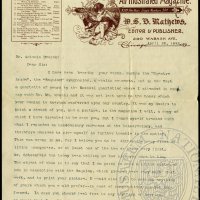Mathews W.S.B. Dvořák Antonín
Základní informace
Dopis
Dr. Antonin Dvorak
Dear Sir:
I have been hearing your works, such as the “Spectre Bride”, the “Requiem” symphonies, a violin concerto, and in New York a quartette of yours by the Kneisel quartette (where I attended in company with Dr. Wm. Mason) and it was not lost upon me the honor which your coming to American conferred upon our country. It was my desire to print a sketch of you, and a picture, in the magazine I edit, a copy of which I have directed to be sent you[!]1 . But I found myself treated with what I regarded as unnecessary rudeness at the Conservatory, and therefore decided to give myself no further trouble in the matter. This was wrong in me, for I believ[!]2 you to be either the very first of living composers, or at least one of the two or three very first. Mr. Schoenfeld has today been telling me how nice you were to him. The object of this is to say that I am going to make a little sketch of you in connection with the Requiem, which pleased here very much last week, and to print your picture. I would also like to mention anything of yours which you would prefer-- in case of compositions not yet performed. In case you should feel free to say anything of America, or music, that I could print, I would be glad to put it in.
But my immediate object is to say to you that if you feel free to say anything encouraging concerning Mr. Shonfeld’s work, anything that I could publish, it would do him good, and I should be very glad to get it.
In regard to your Requiem, I will say that it appears to me one of the purest musical works the Apollo Club has done for years. That you are not everywhere in it governed by the same principles, is a fact due to the trasitional[!]3 state in which music just now is. For instance I find what the painters call “impressionist” methods in the general treatment of the text (but a very deep and poetic impressionism), and in other places the long rhythmic swing of the classic method (as in the “Quam olim Abraham” and another movement that I cannot at the moment recall; and yet again a trace of realism, as when the congregation mutters its prayers, as the “requiem asternam” in 16th notes.
In short it is a great work. Your orchestration pleased us all very much, and I was particularly gratified with the moderation of it, considering the temptation to let loose after the manner of Berlioz on the Dies Ire[!]4 . All this, however, you will care but little for. And so allow me once more to introduce myself as a real admirer of the composer, and a would-be friend to the man.
I hope you will remain in America a long time.
Very Respectfully,
W.S.B. Mathews
- to be sent to you
- believe
- transitional
- Irae

